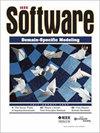降低能耗:就解决人工智能驱动软件系统的能耗问题采访费德丽卡-萨罗(Federica Sarro
IF 3
4区 计算机科学
Q2 COMPUTER SCIENCE, SOFTWARE ENGINEERING
引用次数: 0
摘要
人工智能在带来好处的同时,也给环境带来了巨大的能源成本。软件工程在降低成本方面能发挥什么作用?为此,IEEE Software 采访了英国伦敦大学学院软件工程教授 Federica Sarro 博士。本文章由计算机程序翻译,如有差异,请以英文原文为准。
Powering Down: An Interview With Federica Sarro on Tackling Energy Consumption in AI-Powered Software Systems
The benefits of AI come at considerable energy cost to the environment. What is the role of software engineering in mitigating that cost? To find out, IEEE Software spoke to Dr. Federica Sarro, a Professor of Software Engineering at University College, London, England.
求助全文
通过发布文献求助,成功后即可免费获取论文全文。
去求助
来源期刊

IEEE Software
工程技术-计算机:软件工程
CiteScore
5.50
自引率
6.10%
发文量
182
审稿时长
6-12 weeks
期刊介绍:
IEEE Software delivers reliable, useful, leading-edge software development information to keep engineers and managers abreast of rapid technology change. Its mission is to build the community of leading software practitioners. The authority on translating software theory into practice, this magazine positions itself between pure research and pure practice, transferring ideas, methods, and experiences among researchers and engineers. Peerreviewed articles and columns by seasoned practitioners illuminate all aspects of the industry, including process improvement, project management, development tools, software maintenance, Web applications and opportunities, testing, and usability. The magazine''s readers specify, design, document, test, maintain, purchase, engineer, sell, teach, research, and manage the production of software or systems that include software. IEEE Software welcomes articles describing how software is developed in specific companies, laboratories, and university environments as well as articles describing new tools, current trends, and past projects'' limitations and failures as well as successes. Sample topics include geographically distributed development; software architectures; program and system debugging and testing; the education of software professionals; requirements, design, development, testing, and management methodologies; performance measurement and evaluation; standards; program and system reliability, security, and verification; programming environments; languages and language-related issues; Web-based development; usability; and software-related social and legal issues.
 求助内容:
求助内容: 应助结果提醒方式:
应助结果提醒方式:


